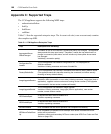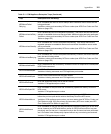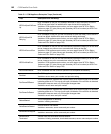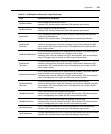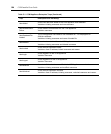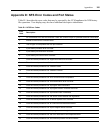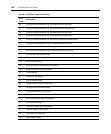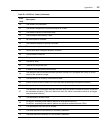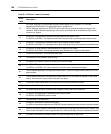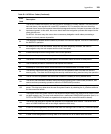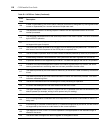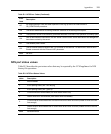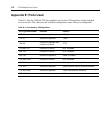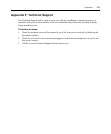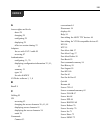
108 CCM Installer/User Guide
73
An invalid argument or unsupported argument was supplied for an operation. For example,
attempting a READLINK on an object other than a symbolic link.
NFSv3 example: attempting to SETATTR with a time field on a server that does not support the
operation. NFSv4 example: specifying a value for an enum field that is not defined in the protocol
(such as nfs_ftype4).
74
For NFSv2: The operation caused a file to grow beyond the server’s limit.
For NFSv3 and NFSv4: The operation would have caused a file to grow beyond the server’s limit.
75
For NFSv2: The operation caused the server’s file system to reach its limit.
For NFSv3 and NFSv4: The operation would have caused the server’s file system to exceed its limit.
76
For NFSv2: A write operation was attempted on a read-only file system.
For NFSv3 and NFSv4: A modifying operation was attempted on a read-only file system.
77 For NFSv3 and NFSv4: Too many hard links exist.
78 The filename in the operation was too long.
79 An attempt was made to remove a directory that was not empty.
80
For NFSv2: The client’s disk quota on the server has been exceeded.
For NFSv3 and NFSv4: The user’s resource limit on the server has been exceeded.
81
The file handle specified in the arguments was invalid - it either no longer exists or access to it has
been revoked.
82
The file handle specified in the arguments referenced a file on a nonlocal file system on the server
(that is, there were too many levels of remote in the path).
83 The server’s write cache used in the WRITECACHE call was flushed to the disk.
84 The file handle failed internal consistency checks.
85 An update synchronization mismatch was detected during a SETADDR operation.
86
For NFSv3, the READDIR or READDIRPLUS cookie is stale.
For NFSv4, the READDIR cookie is stale.
87 The operation is not supported.
88
For NFSv3: the buffer or request is too small.
For NFSv4: the encoded response to a READDIR request exceeds the size limit set by the initial request.
89
An error occurred n the server which does not map to any of the legal NFS protocol error values. The
client should translate this into an appropriate error. UNIX clients may choose to translate this to EIO.
90 An attempt was made to create an object of a type not supported by the server.
Table D.1: NFS Error Codes (Continued)
Error
Code
Description



